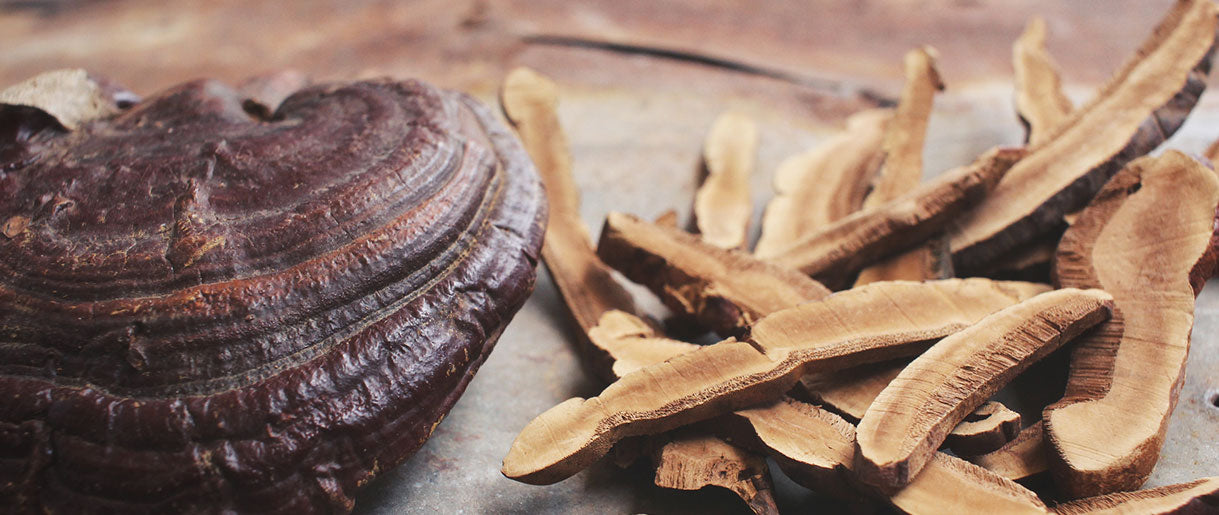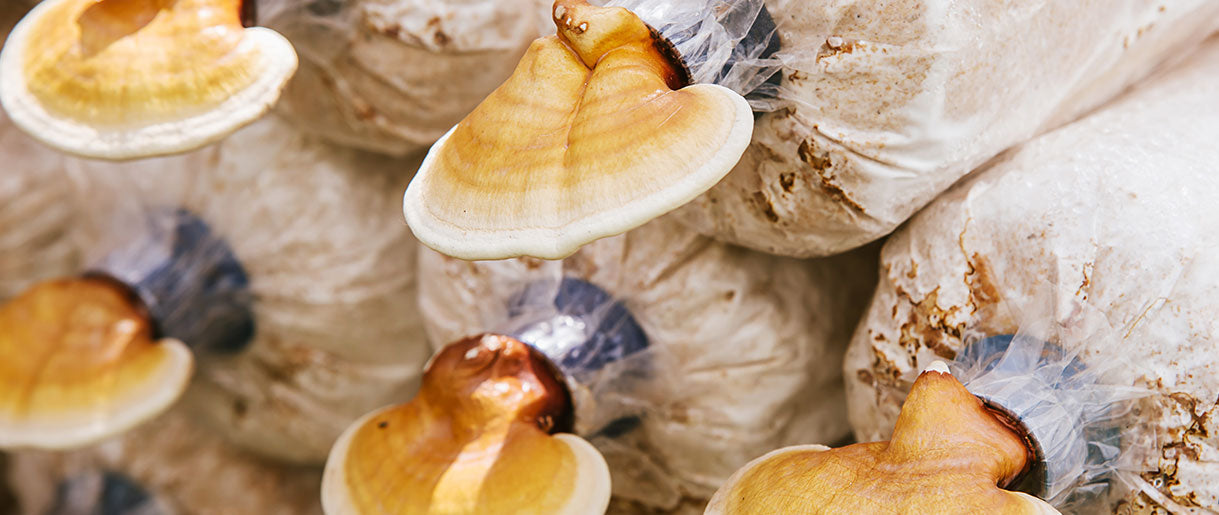Reishi mushroom is a true healing miracle. The mushroom has antiviral, antibacterial, antifungal, and antimicrobial properties. It modulates the immune system and aids in the healing process. But can Reishi mushroom cure herpes?
When eaten, Ganoderma mushroom has been demonstrated to treat herpes infection and shingles effectively. As an adaptogenic herb, it helps adapt to stress, minimizing the adverse effects of herpes flare-ups on the body and immune system.
Let’s explore the potential Reishi mushroom herpes benefits and how the mushroom helps manage the symptoms of the viral infection.
Understanding Herpes

Herpes simplex virus (HSV), commonly called herpes, is a common infection that can result in painful blisters or ulcers. Cold sores, also known as fever blisters, usually appear around the lips or mouth and are caused by herpes simplex virus type one (HSV-1).
Herpes simplex virus type two (HSV-2) causes herpes blisters in the vaginal region. When a person has active blisters, they are incredibly contagious. The most prevalent mode of transmission is skin-to-skin contact during an active phase.
Many people have asymptomatic HSV, which means they have the virus but have never had a herpes outbreak or active episode. Others may develop tiny, fluid-filled blisters or sores on occasion. These blisters are typically found on the genitals, mouth, and lips but can also form on your hands, fingers, and other body parts.
HSV can be transferred sexually but can also be transmitted in other ways. Herpes is stigmatized, but the virus is incredibly prevalent – and nothing to be embarrassed about.
Although there is no cure for herpes, antivirals and home treatments can help reduce the intensity of symptoms. Antiviral treatment may also result in fewer herpes outbreaks.
Reishi Mushroom Overview

While Reishi mushroom, also known as "Lingzhi" in Chinese, is still largely unknown in Western cultures, it has been cherished in Asian communities for hundreds of years. It is one of the oldest symbols of well-being and longevity. These "mushrooms of immortality" are found in the wild on plum trees and were traditionally restricted to royal usage only.
It wasn't until the second part of the twentieth century that researchers began to thoroughly investigate the medicinal benefits of Reishi mushroom, also known as Ganoderma lucidum, in the scientific community.
Reishi mushrooms are the easiest to detect in the wild since they frequently appear distinct. The mushroom grows on dead or dying trees. You know you're looking at a Reishi mushroom if you notice a shelf fungus with a deep red body and colors that soften to orange, yellow, and white near the cap's margins.
So far, laboratory research has revealed some intriguing chemicals in Reishi mushrooms. They are as follows:
- Beta-glucans - These substances may prevent cancer cell spread and proliferation. Animals fed beta-glucans showed more active and more robust immune systems in tests.
- Sterols - In the body, they act as precursors of human hormones.
- Triterpenes - These have anti-allergy and blood pressure-lowering properties.
Reishi Mushroom And Herpes: Potential Benefits And Research

There are numerous therapeutic claims made concerning the advantages of Reishi mushrooms. Some have been well-researched and proven, but others currently lack scientific support. Two scientific studies have backed the benefits of Reishi mushroom for herpes. We explore them below.
In a study to determine its antiviral potential, Reishi was tested against four pathogenic viruses. They were as follows:
- Herpes Simplex Virus Type 1 (HSV-1)
- Herpes Simplex Virus Type 2 (HSV-2)
- Influenza A Virus (Flu A)
- Vesicular Stomatitis Virus (VSV)
These antiviral properties prevent HSV and VSV cytopathic effects and the formation of HSV-2 plaques. It also displayed intense antiviral activity against the VSV New Jersey strain. These findings imply that these fungi could be used to create antiviral drugs.
Cytopathic effects prevent the virus from causing structural changes in infected cells, and inhibiting plaque formation prevents the virus from killing cells.
In another study(1), ganoderic acid T-Q and TR, the most well-known medicinal mushrooms in Asia, were discovered to be two potential broad-spectrum inhibitors against influenza NAs, specifically H5N1 and H1N1 NAs. According to this study, specific components of Reishi mushroom help block the H5N1 and H1N1 Neuraminidase (NA) inhibitors. NAs are widely used in antiviral drugs to prevent virus spread. Based on the study's findings, these parameters may have beneficial implications for the design and development of NA inhibitors.
Managing Herpes Symptoms With Reishi

Reishi mushroom also improves immunological function, allowing your immune system to combat the illness more effectively. Several studies have found that Reishi mushrooms can change the genes in white blood cells, altering and reducing inflammation levels. When you minimize inflammation, your body is better prepared to fight infection.
So, how do you consume Reishi mushrooms? Because the mushroom has a bitter, woody flavor, it is generally prepared as a tea or extract. Reishi mushroom is now farmed professionally worldwide due to its growing popularity. It is available in various forms ranging from teas and tinctures to capsules and may even be found in superfood protein powder combinations. In other words, while Reishi mushrooms may not taste delicious when combined and consumed correctly, they can be delectable.
FAQs About Reishi Mushroom Herpes
Are There Any Specific Precautions Or Considerations When Using Reishi Mushroom For Herpes?
Because Reishi may decrease blood pressure, it is better avoided if you already have low blood pressure. Consuming Reishi raises the risk of bleeding; thus, avoid it if you have hemophilia or another bleeding problem. Be mindful that common drugs such as aspirin and ibuprofen may disrupt blood coagulation and should not be combined with Reishi.
Are There Any Potential Side Effects Or Interactions With Reishi Mushroom Use For Herpes?
While research generally indicates that the fungus is safe to use, certain studies have identified insomnia and nausea as potential adverse effects of Reishi consumption. It may also induce vomiting, diarrhea, and muscle pain.
How Long Does It Take To See Results When Using Reishi Mushroom For Herpes Management?
Reishi mushroom needs time to build in your system and won’t work overnight. The mushroom may take up to two weeks to see results for herpes management.
Key Takeaway
Reishi mushroom herpes benefits have been proven in scientific studies. In addition, the mushroom combats inflammation and makes the immune system stronger. These properties make it one of the best mushrooms for herpes.
References
- Inhibition of neuraminidase by Ganoderma triterpenoids and implications for neuraminidase inhibitor design, (1)https://www.nature.com/articles/srep13194








Let Us Know Your Comments